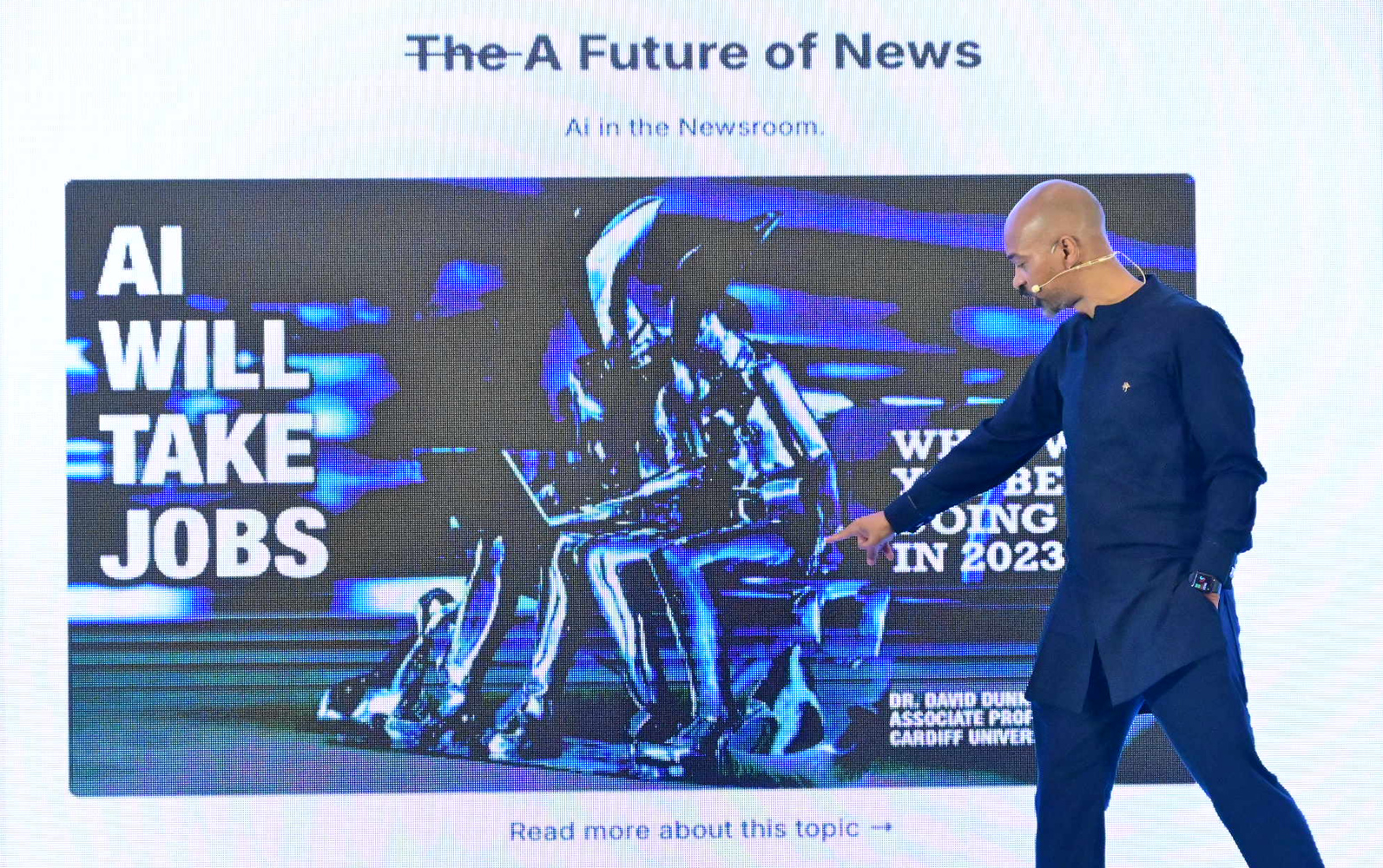I told my Masters students AI is going to take jobs in 2019. It was a lecture to prompt a discussion about what should we do? My words however did not land well.
Today I got my AI Agent to become my personal assistant acting as my researcher. Through iterations I'll improve its functionality.
But first this: a 2007 viral and prophetic video, "Did you Know," with lines like: The top 10 in-demand jobs in 2010 did not exist in 2004."
Those Jobs were:
1. Social Media Manager
2. Mobile App Developer
3. Search Engine Optimization (SEO) Specialist
4. Cloud Computing Specialist/Architect
5. Data Scientist/Analyst (Big Data focus)
6. User Experience (UX) Designer
7. Digital Marketing Specialist
8. Cybersecurity Analyst/Specialist
9. Online Community Manager
10. E-commerce Manager/Specialist
In other words, as stated by the "Did You Know" video, "We're currently preparing students for jobs that don't exist."
This is where we are now in 2025 I told the audience at Talk Journalism, one of India's brand journalism gatherings whose keynotes have included Edward Snowden.
In 2025 jobs that will be common place in 2028 do not exist, or were not prevalent in 2019. Jobs like:
1. AI Ethics and Governance Specialist/Officer
2. Prompt Engineer / AI Interaction Designer
3. AI Trainer/Curator (Advanced Specializations)
4. AI System Integrator / Orchestrator
5. AI "Agent" Supervisor / Fleet Manager
6. Human-AI Collaboration Facilitator / Productivity Analyst
7. AI-Powered Education Specialist / Adaptive Learning Designer
8. Predictive Maintenance Engineer (AI-focused)
9. AI blended-journalist
10. Virtual Reality/Augmented Reality AI Integration Specialist
11. AI-Driven Waste Management Strategist
What the 2007 video underlined is that, given the major disruption by digital, industry and people would find their way. It won't be pretty. If you worked in a travel agent for instance, the net had swallowed that up. That was the future we were wrestling with. Engage or be evicted.
Those digital roles today are now common place and the fears now fall on AI. But for the meantime there's growing concern in academia. Some students used to their chatGPTs may have to suspend their actions. And what about those jobs?
In 2019 we launched a creative technologist program incorporating AI. That program has run its course, so new approaches are being fashioned. Eric Schmidt says jobs like being a lawyer, or manager won't go away - at least just not yet until the next wave with AGI and Super AI.
So the job you're doing will likely stay but be augmented, reshaped and re-branded. An AI-blended journalist?
Gary Kasparov, Grand Master Chess Player was behind Centaurs - Chess players using AI, which is now popular.
But we humans are resilient and unpredictable. In 1920 with the Ford car, the horse population plummeted, only to rise again some 30 years later. We quite like our biological species after all.
So to my agent! Will it replace me? Perhaps not quite yet. The trouble is those AI skills will be disruptive, so creativity of an order that isn't logical will be a premium
So lets try and look to a future of journalism. There are several issues that require attention.
The more prominent ones are:
* AI and Deep fakes
* Impact of Tech and Social Media
* Use of psyops
But there's a persistent theme that has been a recurring problem for journalism and factual storytelling way before we were impacted by the aforementioned.
* Societal necessity
I've been a journalist since the 90s and can thread my work with a de facto needle of the future of journalism which more recently envelops presentations on AI-journalism, and includes chairing my Uni's FOJ which bi-annually brings together some 300 academics.
Back in the 90s few outfits were accustomed to the theme FOJ, but you could spot its progress through camera technology and personnel. The prog. BBC Reportage showed how to make journalism accessible to twenty-somethings; Channel One and Channel 5 looked to deconstruct journalism. Channel One introduced videojournalism, acting as a precursor for a new style of journalism today Cinema Journalism.
Today we're so attuned to AI and Tech, that we tend to forget that psyops packaged as PR has been journalism's nemesis particularly from the 1920s with Edward Bernays, the father of PR, demonstrating how to manipulate people's minds. If you haven't watched Century of Self by Adam Curtis you absolutely must.
Cultural indifference has been a fundamental achilles of journalism way before we'd place emphasises on AI and tech. Biases in storytelling and selection are baked into communications.
The eminent Prof Stuart Hall's 1979 BBC Two broadcast ‘It Ain’t Half Racist, Mum’ laid bare (though for many it was invisible) how journalism is constructed to favour the dominant culture in selection and reporting.
Many journalists of colour wearing their Du Bois persona could relay countless personal stories themselves.
In international journalism and storytelling, the lack of cultural awareness, even sensitivity, becomes a pressing problem. Cultural indifference means journalists ignore a cultural group's plight for their dominant perception ( with the audience in mind?)
Addressing this requires going back to the heart of journalism storytelling and comprehending the necessity of societies - an attribute that changes over time.
TV journalism birthed in the 1950s that hasn't changed much, cannot be the answer for today. This is a quote from a former senior BBC executive.
So what happens next?
More Articles by David
-
Game On, Reimagining “Nessun Dorma”
Exploring AI in operatic storytelling.
-
The Thirty Who Changed Britain's Media
A look back at media pioneers.
-
BBC GLR Archives: A Rediscovered History
Uncovering lost voices from early 90s radio.
-
History Repeats: Why AI Won’t “End” Filmmaking, Just Evolve It
Insights on AI's impact on filmmaking.
-
My Journey in Videojournalism
Reflections on a pioneering career.
-
The Power of Sonic Dimensions in Research
Deep dive into sound's role in history.
